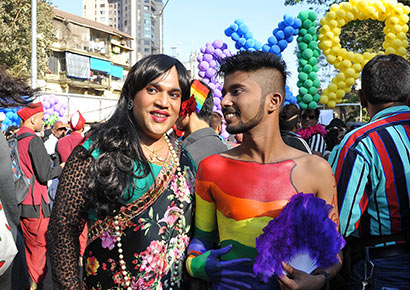India’s Supreme Court starts hearings on reviewing gay ban

2016 Mumbai LGBT Pride
India’s LGBTQ community is hopeful as the Supreme Court formally begins the process of reviewing the country’s colonial-era ban on homosexuality.
India is the largest democracy in the world to still outlaw consensual same-sex relations, with a maximum penalty of life in prison.
In January, the court announced it was preparing to re-look at its 2013 decision upholding Section 377 of the Indian Penal Code, which punishes “carnal intercourse against the order of nature”.
In addition to organisations, a number of high profile individuals have petitioned the court to repeal Section 377. These include dancer Navtej S Johar, journalist Sunil Mehra, famous chef Ritu Dalmia, hotelier Aman Nath and business executive Ayesha Kapur. For the first time, these individuals are set to personally testify as to the impact that the law has had on their lives.
“The momentum has built up for this moment,” Anjali Gopalan, founder of the Naz Foundation, told The Guardian. “We have a clutch of petitions from people from all walks of life. We have celebrities giving their personal testimony. Then we have had an important ruling recently by the courts upholding privacy. And we have seen a shift in recent years, more people coming out to take a stand. The gates have opened, as it were, and you can’t close them now.”
Section 377 was previously repealed for four years by the Delhi High Court in 2009. In 2013, however, the Supreme Court shocked the world when it overturned the lower court’s ruling and asserted that the ban on homosexuality was not unconstitutional.
There is renewed hope that the Supreme Court will take a more progressive approach this time, especially after its August 2017 ruling that the right to privacy is “a fundamental right” and that “sexual orientation is an essential attribute of privacy”. Activists say that the landmark ruling is seemingly incompatible with Section 377 and any continued support for the ban by the court.
Decriminalising homosexuality is being strongly opposed by conservative and religious groups in India. Politician and MP Subramanian Swamy, for example, has called for Section 377 to stay.
On Tuesday he told news agency ANI: “It [homosexuality] is not a normal thing. We cannot celebrate it. It’s against Hindutva [Hinduness]. We should invest in medical research to see if it can be cured.” Swamy says that the law is needed to stop gay people from “flaunting” their sexuality in public.
- Facebook Messenger
- Total110
Leave a Reply